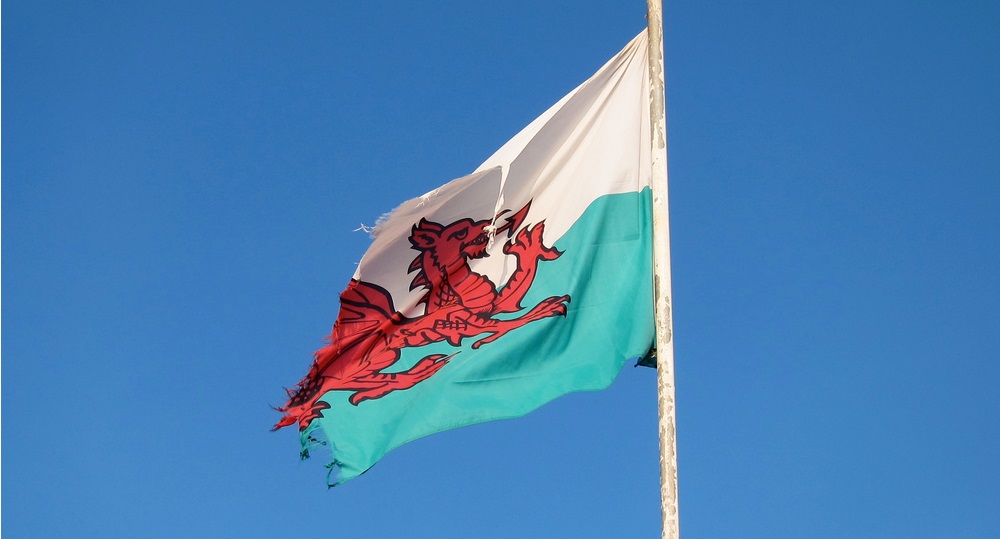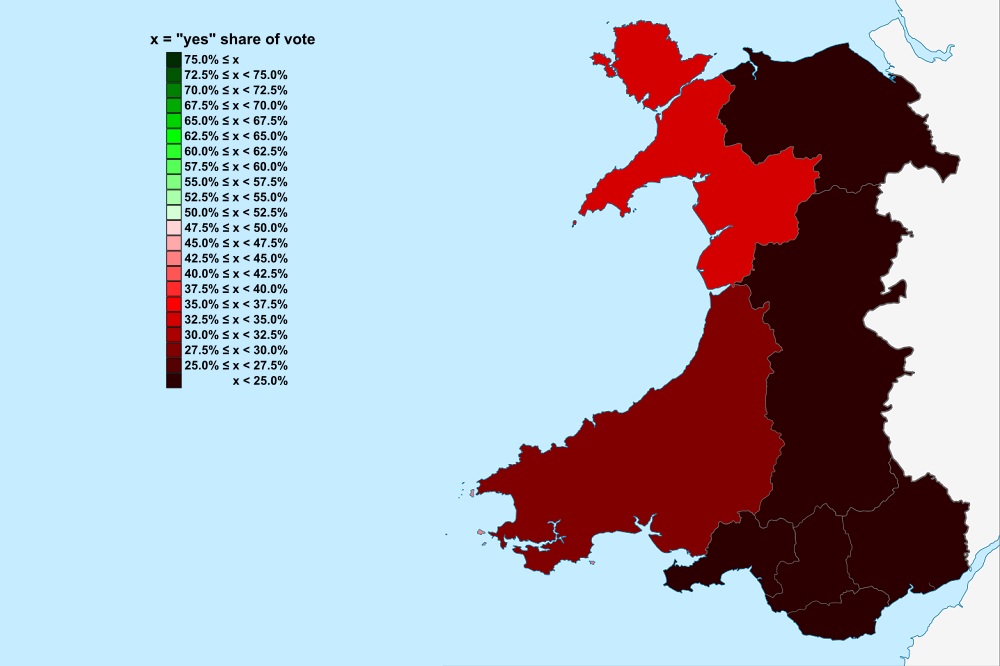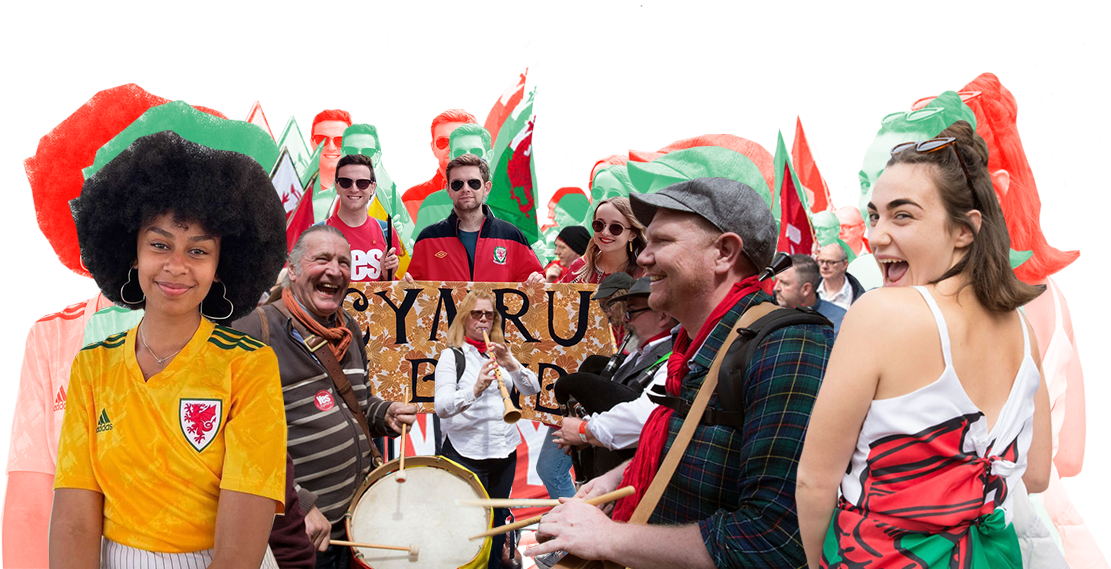Living in the aftermath of referendum: how writers responded to the failure of 1979

*English version follows below*
Menna Machreth
Un o’r prif bethau sy’n taro rhywun wedi’r Rali ‘Annibyniaeth i Gymru’ mwyaf erioed dros y penwythnos, yw pa mor gyflym bu i’r sgwrs newid a bod annibyniaeth bellach yn cael eu drafod fel rhywbeth allasai ddigwydd o fewn ein hoes ni. Ddeugain mlynedd yn ôl, roedd cenedlaetholwyr yn dod i delerau â refferendwm datganoli aflwyddiannus, ac â ninnau ar drothwy’r Eisteddfod Genedlaethol yn Llanrwst, addas yw edrych yn ôl ar ymateb llenorion i’r siom a sut y bu i ddiwylliant chwarae ei rhan i symud ymlaen o’r chwalfa.
Ym 1979, ar lwyfan yr Eisteddfod Genedlaethol bu un o’r digwyddiadau mwyaf dramatig yn hanes yr ŵyl. Yng nghystadleuaeth y Goron, roedd y beirniaid yn gytûn mai ymgais Ianws oedd y gorau ond gwaharddwyd yr enillydd pan ddaeth i’r amlwg mai gwaith dau fardd oedd yr ymgais fuddugol; sef T. James Jones, o deulu diwylliedig Parc Nest, a Jon Dressel, Americanwr o dras Cymreig.
Bwriad Jon Dressel a T. James Jones wrth dorri confensiwn un o brif gystadleuaethau’r Eisteddfod Genedlaethol oedd pwysleisio’r argyfwng a wynebai Cymru fel cenedl yn dilyn methiant refferendwm 1979. Roedd y gyfres o gerddi yn darlunio’r wythnos pan gynhaliwyd refferendwm yng Nghymru am fesur o hunan-reolaeth – cynnig a wrthodwyd yn glir gan bleidleiswyr Cymru gyda dim ond 20.3% o’r bleidlais oedd o blaid sefydlu Cynulliad cenedlaethol i Gymru.
Neges y cerddi oedd bod rhaid wynebu difancoll y genedl gan y byddai hi’n sicr o gael ei chymhathu’n llwyr â Phrydain – heb arlliw o’r nodau gobeithiol o adfer cenedl a oedd fel arfer yn rhoi ffug-gysur i genedlaetholwyr. Drwy herio confensiwn yr Eisteddfod awgryma’r beirdd mai ofer fyddai cynnal defodau’r Eisteddfod yn oddefol bellach, a galwai’r beridd am weithredu ymarferol wleidyddol i ddiogelu parhad y genedl a’r iaith. Dywedodd Dressel yn ddiweddarach: ‘Our motivation had been to make the Welsh people confront the enormity of what they had done, as we saw it, rather than win the Crown’.[1]
Mae’r gyfres o gerddi yn cynnwys delweddau o wanwyn yn erthylu ei hun, gan gyfleu bod rhywbeth annaturiol a throedig yn nymuniad y Cymry i wrthod hunan-reolaeth gan hyd yn oed ddweud fod y Cymry fel defaid yn eu taeogrwydd.[2] Roedd y beirdd yn coleddu safbwynt cenedlaetholdeb ddiwylliannol, yn seiliedig ar yr iaith Gymraeg, ac mae nifer wedi dadlau bod yr ymgyrch am Gynulliad Cenedlaethol yn 1979 yn cynrychioli dyheadau i adfer syniad arbennig o Gymru nad oedd yn ddigon eang ei apêl; gwrthododd pobl Cymru y dadleuon academaidd a fethodd i ymestyn tu hwnt i’r diwylliannol i ennill tir ar faterion yn ymwneud â’r economi a llesiant.
Nid beirdd Cymraeg yn unig a oedd yn torri eu calonnau; achosodd siom y canlyniad i Raymond Garlick, bardd o Loegr a wnaeth Cymru’n gartref iddo, i beidio ag ysgrifennu mwyach. Ysgrifennodd ‘The Eighth Day’, mewn ymateb i’r referendwm sef cerdd am Dduw didostur yn corlannu’r gwannaf o blith yr hil ddynol ar dir Cymru: ‘Then let them crawl, he said, and fawn / Let them deny their nature and / Their language. Let them be unfit / To rule themselves…’[3]
Dyma Gymru, nid ar lun y genedl etholedig, ond ar lun y genedl golledig. Mae’r gerdd yn drwm dan ddylanwad R. S. Thomas, ac roedd Galick yn ladmerydd mawr o’r hyn a welai fel y traddodiad ‘Eingl-Gymreig’ neu Llenyddiaeth Saesneg Cymru. Credai llenorion a ysgrifennai yn Saesneg y gallasai datganoli ym 1979, a chydnabod Cymru fel endid annibynnol, fod wedi cadarnhau eu hunaniaeth fel na fyddent yn teimlo fel lleiafrif rhwng dau draddodiad llenyddol – llenyddiaeth Gymraeg a llenyddiaeth Saesneg Lloegr.
Bu digon o wewyr a rhincian dannedd am y ddegawd ddilynol, ond yn nhŷb Iwan Llwyd, nid y gobaith o gael hunan-lywodraeth yn unig a roddwyd yn y bedd gan ganlyniad y refferendwm ond holl feddylfryd a syniadau’r Gymry Gymraeg am y bywyd Cymraeg. Enillodd Iwan Llwyd y goron ym 1990 (cystadleuaeth yr oedd T. James Jones yn feirniad arni) am gasgliad o gerddi a oedd yn darlunio angladd yr hen Gymru a genedigaeth cenedl newydd; defnyddiodd syniad yr Aborijiniaid o ‘ganu’r’ greadigaeth i mewn i fodolaeth i gyfleu sut gallai llenorion hefyd ‘ganu’ Cymru newydd i fodolaeth yn eu gwaith. Cydnabyddodd Iwan Llwyd mai cerddi Ianws a ysgogodd yr hyn a welai fel y dadeni barddonol a oedd ei angen er mwyn i’r diwylliant Cymraeg symud ymlaen o’r refferendwm ac ail-greu Cymreictod: ‘Dyma’r man cychwyn. O edrych i waelod y pydew, mae gobaith ailgodi. Gofynnodd Ianws gwestiynau caled ar adeg anodd. Gofynnodd hwy drwy herio rheolau un o brif gystadleuthau’r Brifwyl. Ac o’u gofyn, galluogwyd cenhedlaeth newydd o feirdd i chwilio cyfeiriadau a delweddau newydd er mwyn ymateb i gyfnod o newid a gwrthdaro cymdeithasol a gwleidyddol na welwyd ei debyg er y 30au.’[4]
Aeth Iwan Llwyd ati yn ystod ei yrfa i fynd â barddoniaeth Gymraeg i’r dafarn, ar y cyfryngau torfol, gan gydweithio ag artistiaid a cherddorion, yn ogystal â beirdd Saesneg Cymru a beirdd rhyngwladol ynghyd â thrafod y newidiadau enbyd roedd Cymru yn eu profi dan law Thatcheriaeth a chyfalafiaeth yn ystod yr 1980au. Roedd Menna Elfyn yn fardd arall a gynhwysai profiadau newydd yn ei gwaith, gan uniaethu a mudiadau eraill fel ymgyrch merched Commin Greenham, a dechreuodd brosiect o gyfieithu ei barddoniaeth i’r Saesneg mewn partneriaeth â beirdd-gyfieithwyr. Erbyn 1997, roedd Cymru yn le gwahanol iawn am resymau gwleidyddol, ecomomaidd a gweinyddol, ond roedd diwylliant hefyd wedi chwarae rhan bwysig wrth geisio ehangu’r syniad ynghylch beth a olygai i fod yn ddinesydd o Gymro, ac nad rhywbeth i garfan fach fyddai hunan-lywodraeth ond rhywbeth i holl bobl Cymru.
Heddiw, rydym yn byw yn ystod debacle refferendwm arall, un sy’n fygythiad i’r cynnydd a wnaed o ran hunanreolaeth i Gymru. Mae Brexit wedi dwysau y pegynnu ymhlith carfannau mewn cymdeithas – y rhai sydd o blaid ac yn erbyn gadael yr Undeb Ewropeaidd – ond mae gan gelf y gallu i greu deialog ac i greu pontydd rhwng pobl. Ac mewn cyd-destun pan fo Cymru yn cael ei hepgor yn aml o’r drafodaeth ar lwyfan Prydeinig, y mwyaf yw’r angen am feirdd, llenorion, artistiaid a lleisiau i greu a chynnal trafodaeth am ddinasyddiaeth Cymreig, Prydeinig ac Ewropeaidd.
Felly, a welwn ni lenorion yn torri confensiynau’r Eisteddfod eleni yn Llanrwst er mwyn pwysleisio mor ddychrynllyd yw’r Brexitagedon sydd o’n blaenau? Go brin, ond er bod angen i ni leisio’r peryglon i’r genedl yn sgîl Brexit ynghyd â bywyd dan fawd Boris, mae’r un mor bwysig i lunio gweledigaeth amgen ar gyfer y Gymru rydym ni am fyw ynddi a ‘chanu’ dyheadau am annibyniaeth i mewn i fodolaeth. Mae gan ddiwylliant rôl bwysig i’w chwarae fel pob maes arall wrth i ni gerdded tuag at annibyniaeth a cheisio dod â dinasyddion Cymru yn eu holl amrywiaeth gyda ni ar y daith i greu cenedl gynhwysol a theg i bawb.
Darllen pellach:
Tony Conran, Frontiers in Anglo-Welsh Poetry (Cardiff: University of Wales Press, 1997)
Peredur Lynch, ‘Refferendwm 1979, Cerddi Ianws a Thopos y “Y Cymry Taeog”’, yn Wiliams, Gerwyn (gol.), Ysgrifau Beirniadol XXX (Dinbych: Gwasg Gee, 2011), tt. 78-109.
Wiliam Owen Roberts ac Iwan Llwyd, ‘Myth y Traddodiad Dethol’, Llais Llyfrau (Hydref 1982), tt. 10-1.
Wiliam Owen Roberts ac Iwan Llwyd, ‘Mae’n Bwrw yn Toremolinos’, Y Faner, 14 Rhagfyr 1984, tt. 6-7.

Menna Machreth
One of the main things that struck me after the largest Independent Wales Rally ever last weekend, is how quickly the conversation has moved on and that independence is seen now as something which could happen in our lifetime.
Forty years ago, Welsh nationalists were coming to terms with an unsuccessful referendum on devolution, and as we approach yn Eisteddfod in Llanrwst next week, it’s timely to look back at the response of poets to the disappointment and how culture played its part to move on from the wreckage.
In 1979, on the stage of the National Eisteddfod, one of the most dramatic events in the history of the festival took place. In the Crowning ceremony, one of the festival’s main poetry competitions, the judges agreed the best entry was by a poet using the nom de plume Ianws (the Roman god ‘Janus’) but the work was quickly disqualified when it became apparent that the winning composition was the composition of two poets; T. James Jones, of the well-known family of poets of Parc Nest, and Jon Dressel, an American from Welsh descent.
By breaking the rules of one of the Eisteddfod’s main competitions, Jones and Dressel wanted to draw attention to the crisis facing Wales as a nation following the failure to gain a measure of self-government through the 1979 referendum. The series of poetry portrays the week during which the referndum was held when the vast majority of Welsh voters rejected the prospect of a national assembly with only 20.3% of the vote in favour.
The message conveyed in the poetry was the inevitability of complete assimilation with Britishness leading to the death of the nation. By challenging the Eisteddfod’s conventions the poets are suggesting the futility of the Eisteddfod’s rituals in the wake of such devastation, calling upon their co-patriots to political activism to protect the future of the nation and Welsh language. Looking back at the event, Dressel said: ‘Our motivation had been to make the Welsh people confront the enormity of what they had done, as we saw it, rather than win the Crown’.[5]
The poems include images of spring being grotesquly aborted, suggesting that there was something unnnatural and perverse in the Welsh people’s desire to reject self-government, even saying the Welsh were like sheep in their servility.[6] The poets embraced cultural nationalism, rooted in the Welsh language, and many commentators have argued that the idea of Wales projected by cultural nationalists during the referendum campaign wasn’t wide enough in its appeal; the people of Wales rejected the academic arguments which failed to gain ground beyond the cultural to welfare and economic issues.
It wasn’t only Welsh language poets who were heartbroken; the result caused Raymond Garlick, an Englishman who made Wales his home, to abstain from writing poetry for a few years. He wrote ‘The Eighth Day’ in response to the referendum, a poem in which an uncompassionate God gathers the weakest of the human race in Wales: ‘Then let them crawl, he said, and fawn. / Let them deny their nature and / Their language. Let them be unfit / To rule themselves…[7]
This Wales is paradise lost, not the land of chosen people. The poem is heavily influenced by the work of R. S. Thomas, and Garlick was a great promoter of what he saw as the ‘Anglo-Welsh’ tradition or Welsh writing in English. The 1979 referendum provided an opportunity to acknowledge Wales as an independant entity, which Welsh poets writing in English felt could have affirmed their identity as writers on the margins of two literary traditions – Welsh language literature and English literature.
There was weeping and gnashing of teeth aplenty in the next decade’s poetry, but Iwan Llwyd – from a new generation of poets in the 1980s – proposed that it wasn’t only the hope of self-government that was killed by the result of the referendum, but the discourse of the Welsh people about themselves.
Iwan Llwyd won the crown in 1990 for a series of poems which portrayed the funeral of the ‘old Wales’ and the birth of a new expression of Welshness and Welsh culture; he use the Aborigininal concept of ‘singing’ creation into being as an image of how Welsh writers could ‘sing’ a new Wales into being.
Llwyd acknowledged that the Ianws poems were the basis of a new renasissance in Welsh poetry which could help Welsh culture and identity to move on following the referendum: ‘This was the starting point. By looking into the bottom of the pit, there is hope of rebuilding. Ianws asked difficult questions during a painful time. It asked us by challenging one of the Eisteddfod’s main competitions. And by asking them, it enabled a new generation of poets to look for new directions and imagery to respond to a new era of social and political conflict not experienced since the 1930s.’[8]
Iwan Llwyd took Welsh poetry beyond the traditional frontiers and into the pub, mass media, parterning with artists and musicians, and English writers from Wales and international writers, confronting issues Wales was facing under Thatcherism and capitalism.
Menna Elfyn is another example of a poet discussing new experiences in her work, identifying with groups such as the Greenham Common protest camp, and she also started a poetic project of translating her work into English by partnering with a poet-translators. By 1997, Wales was a very different place politically, socially and economically but culture had also played its part to renegotiate what it meant to be Welsh, stripping away the myth that self-government was for a small section of society but something for all of the people of Wales.
Today, we are living during the on-going debacle of another referendum, one which is a huge threat to the progress devolution has made. Brexit has increased the polarization between different groups within society – those for and against leaving the European Union – but art has the ability to create dialogue and bridge between different opinions. When Wales is so often forgotten about in the UK discussion about Brexit, there is even more need for artists to give voice and incite discussion about Welsh, British and European citizenship.
So, will we see a poet breaking the conventions of the Eisteddfod in Llanrwst next week to emphasize the Brexitageddon facing us? It’s unlikely, although we do need culture to voice anxieties about what faces the nation following Brexit and life under Boris’s thumb, but it’s also vital for contemporary culture to engage the people of Wales with a vision for the Wales we want to create together and ‘sing’ into being the aspirations for independence.
Culture has an important rôle to play as we march towards independance, maybe more important than we realise, as we try to bring whoever chooses to make Wales their home on the journey with us to create a just and inclusive nation for all.
Further reading:
Tony Conran, ‘An Abdication from Time: an Essay on the Collected Poems of Raymond Garlick’, New Welsh Review, 1, 1 (1988), tt. 49-53.
Tony Conran, Frontiers in Anglo-Welsh Poetry (Cardiff: University of Wales Press, 1997)
Peredur Lynch, ‘Refferendwm 1979, Cerddi Ianws a Thopos y “Y Cymry Taeog”’, yn Wiliams, Gerwyn (gol.), Ysgrifau Beirniadol XXX (Dinbych: Gwasg Gee, 2011), tt. 78-109.
Wiliam Owen Roberts ac Iwan Llwyd, ‘Myth y Traddodiad Dethol’, Llais Llyfrau (Hydref 1982), tt. 10-1.
Wiliam Owen Roberts ac Iwan Llwyd, ‘Mae’n Bwrw yn Toremolinos’, Y Faner, 14 Rhagfyr 1984, tt. 6-7.
[1] Jon Dressel, ‘The Road to Shiloh’, New Welsh Review, 6, 3 (1993/94), t. 20.
[2] T. James Jones a Jon Dressel, Cerddi Ianws Poems (Llandysul: Gwasg Gomer, 1979)
[3] Raymond Garlick, Collected Poems 1946-86 (Llandysul: Gwasg Gomer, 1987), t. 135.
[4] Iwan Llwyd, ‘Rowlio Cerrig’, Barddas, 252, t. 27.
[5] Jon Dressel, ‘The Road to Shiloh’, New Welsh Review, 6, 3 (1993/94), t. 20.
[6] T. James Jones a Jon Dressel, Cerddi Ianws Poems (Llandysul: Gwasg Gomer, 1979)
[7] Raymond Garlick, Collected Poems 1946-86 (Llandysul: Gwasg Gomer, 1987), t. 135.
[8] Iwan Llwyd, ‘Rowlio Cerrig’, Barddas, 252, t. 27.
Support our Nation today
For the price of a cup of coffee a month you can help us create an independent, not-for-profit, national news service for the people of Wales, by the people of Wales.









Erthygl wych a phryfoclyd o ran gwneud i ni feddwl, Menna. Diolch yn fawr iawn.